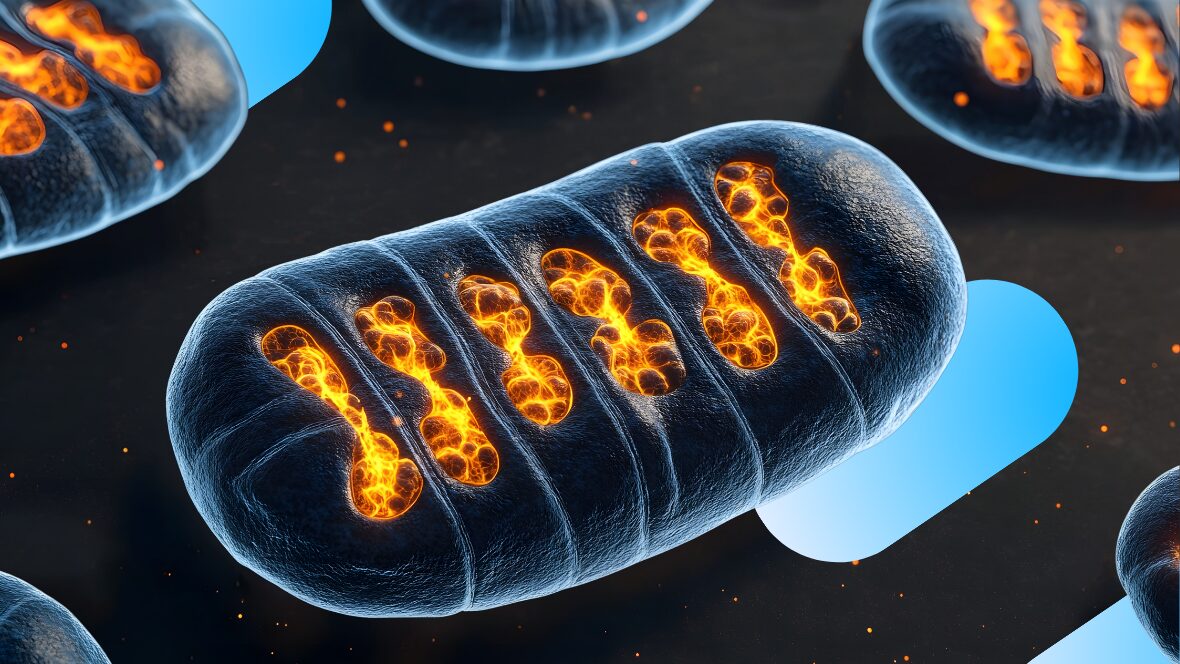The Powerhouses Inside Every Cell
When you think about energy, you might picture your morning coffee or that post-workout endorphin rush. But the real story of energy begins inside your cells — within the mitochondria, tiny organelles often called the “powerhouses” of the body.
Mitochondria convert the food you eat and the oxygen you breathe into adenosine triphosphate (ATP) — the molecule that fuels every function in your body, from heartbeat to brain function. When these mitochondria become sluggish or damaged, your metabolism slows, fatigue creeps in, and your body’s repair systems weaken.
Emerging research continues to show that mitochondrial dysfunction is linked to chronic fatigue, metabolic syndrome, neurodegenerative disease, and accelerated aging (Nunnari & Suomalainen, Cell, 2012).
How Mitochondria Influence Metabolism
Your metabolism isn’t just about burning calories — it’s about how efficiently your cells convert nutrients into usable energy.
Healthy mitochondria help maintain metabolic flexibility — the ability to switch between burning carbohydrates and fats depending on your needs. When mitochondrial function declines, your cells lose that flexibility, leading to slower energy production, weight gain, and insulin resistance (Wallace, Science, 2005).
Factors like stress, toxin exposure, inflammation, nutrient deficiencies, and even blue light overexposure can all damage mitochondrial membranes and DNA. Fortunately, many of these factors are modifiable through lifestyle.
Research-Backed Habits to Support Mitochondrial Health

1. Move Your Body — Especially with Intention
Exercise is one of the most powerful ways to stimulate mitochondrial biogenesis — the process of creating new mitochondria.
Research from Harvard and the Journal of Physiology shows that both aerobic exercise (like brisk walking) and high-intensity interval training (HIIT) promote the growth and efficiency of mitochondria.
Even just 20–30 minutes of daily movement can have measurable effects on cellular energy and metabolism.
2. Nourish with Mitochondrial-Supporting Nutrients
Your mitochondria rely on key nutrients to function properly. These include:
-
CoQ10: Helps shuttle electrons during ATP production (BioFactors, 2019).
-
B-vitamins (B2, B3, B6): Act as cofactors in energy metabolism.
-
Magnesium: Required for ATP stability.
-
Alpha-Lipoic Acid: An antioxidant that regenerates other antioxidants and supports glucose metabolism.
-
Omega-3 Fatty Acids: Strengthen mitochondrial membranes and reduce inflammation (FASEB Journal, 2010).
Building meals rich in colorful vegetables, high-quality proteins, and healthy fats creates an environment where mitochondria thrive.
3. Get Quality Sleep & Manage Stress
Your mitochondria repair themselves during rest. Chronic sleep deprivation increases oxidative stress, leading to mitochondrial DNA damage and reduced ATP output.
Similarly, high cortisol levels from chronic stress impair mitochondrial function.
Practices such as mindfulness, deep breathing, and consistent sleep routines can help restore cellular balance and energy production.
4. Embrace Cold, Light, and Nature
-
Morning sunlight exposure helps regulate circadian rhythm, boosting mitochondrial activity through balanced melatonin and cortisol levels.
-
Cold exposure (like brief cold showers or outdoor walks) has been shown to increase mitochondrial density and fat metabolism (Nature Medicine, 2014).
-
Grounding in nature can reduce inflammation and improve redox balance, indirectly benefiting cellular energy.
5. Reduce Mitochondrial Stressors
Avoiding processed foods, artificial additives, and excess sugar helps limit oxidative stress.
Toxins from plastics, heavy metals, and air pollution can also damage mitochondria — another reason why supporting detox pathways through hydration, antioxidant intake, and gentle movement is key.
When Fatigue Persists: Looking Deeper
If you’re doing “all the right things” yet still feel chronically fatigued, it may be time to test for mitochondrial dysfunction or metabolic imbalance.
Advanced diagnostics — such as organic acid testing, oxidative stress panels, or mitochondrial function assays — can help uncover nutrient deficiencies or toxin exposures that hinder cellular performance.
At Progressive Medical Center, we often incorporate IV nutrient therapy, red light therapy, NAD+ infusions, and metabolic health assessments to help patients restore mitochondrial resilience and energy metabolism from the inside out.
Final Thoughts
Your mitochondria may be microscopic, but their impact is massive. Supporting them through daily habits — movement, nutrition, rest, and mindful living — can transform your metabolism, energy, and longevity.
Small changes truly move the needle. When your cells thrive, you thrive.






